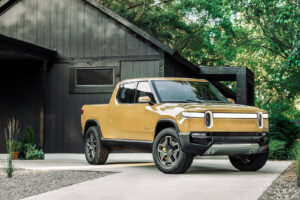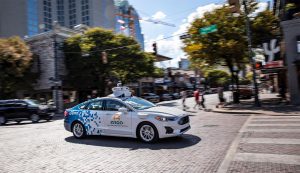
Ford Motor Co. will boost to $29 billion the investment it plans to make in electrified and autonomous vehicles, nearly tripling its bet on a high-tech future where it is positioned as a “mobility” company, rather than just an automotive manufacturer.
The announcement came on the same day the second-largest Detroit automaker announced its fourth-quarter and full-year 2020 earnings results. For the final three months of the year, it said, earnings before interest and taxes came in at $1.7 billion, up from $485 billion during the same period a year earlier.
“The transformation of Ford is happening and so is our leadership of the EV revolution and development of autonomous driving,” Ford President and CEO Jim Farley said in a statement. “We’re now allocating a combined $29 billion in capital and tremendous talent to these two areas, and bringing customers high-volume, connected electric SUVs, commercial vans and pickup trucks.”
Ford outlines EV/AV spending plan details

The automaker broke out the details of spending to note that $22 billion will go towards the development of electrified vehicles, another $7 billion to autonomous vehicles, by 2025. It previously had said it would be spending $11.5 billion, all told, though that figure was only to run through the end of 2022.
Ford was an earlier player in the electrified vehicle market with a mix of hybrids, plug-in hybrids and pure battery-electric vehicles, or HEVs, PHEVs, and BEVs. But it has gained relatively modest traction until now, at least when compared to segment leaders like Tesla, Nissan, General Motors and Toyota.
It is looking to catch up with a wave of new products, such as the Lincoln Aviator Grand Touring plug-in, as well as the Ford Mustang Mach-E, the company’s first long-range all-electric model – which last month was named North American Utility Vehicle of the Year by a panel of 50 U.S. and Canadian auto writers.
The company says it has a mix of additional products coming, including an all-electric version of the F-150 pickup. As TheDetroitBureau.com recently reported, Ford also is believed to be working on a replacement for the Fusion sedan that will switch to an all-electric SUV format.
Rival automakers also boost EV spending, sales targets

Ford is by no means the only automaker upping spending on high-tech vehicles. General Motors late last year said it would boost its investment in EVs and AVs to $27 billion by mid-decade. But GM has laid out plans to switch entirely to BEVs by the middle of the next decade, Ford so far saying that it plans to offer a mix of all-electric and hybrid models while maintaining production of some vehicles using internal combustion engines.
Both companies’ plans are dwarfed by the plan outlined by Volkswagen, however, the German giant expecting to invest $86 billion in electric and autonomous vehicles.
All three companies are struggling to gain traction in the pure EV market now dominated by upstart Tesla. GM is the only automaker whose BEV, the Chevrolet Bolt, ranks among the top five vehicles based on sales, and even then lags well behind Tesla’s top-selling products, the Models Y and 3.
Ford is hoping to change the equation this year as it ramps up production for the Mach-E, however, the company claiming that the initial version of the electric SUV sold out soon after it began taking advance reservations back in November 2019.
Industry analysts see 2021 as a breakout year for EV market

A number of industry analysts are forecasting that 2021 will start to see an aggressive ramp-up in sales of electrified vehicles, particularly BEVs which accounted for barely 2% of the U.S. new vehicles market last year. According to the latest forecast by IHS Markit, they’ll reach a 6.0% share by 2023 and 11.28% by 2029. Some other researchers are looking at shares of 20% or more by decade’s end.
BMW last month said it expects its own sales of plug-based models will double this year alone. Bentley, meanwhile, plans to offer only PHEVs and BEVs — such as its new Bentayga plug-in — starting in 2026, with the company switching entirely to all-electric propulsion by 2030.
As for autonomous vehicles, there are a growing number of products using what, in industry parlance, is known as Level 2 technology. This can allow limited hands-free operation under controlled circumstances, notably limited-access highways. Ford will bring out its Co-Pilot 360 system later this year and has formed several alliances aimed at moving up to technology allowing complete hands-free and even driverless vehicle operation later in the decade.
Ford lining up partners for EV/AV development
While much of the money Ford now plans to invest on EV and AV technology will be spent in-house it also has formed several alliances and made other acquisitions. These include ties to electric vehicle start-up Rivian, as well as Argo AI, an autonomous vehicle development operation based in Pittsburgh.
After several years in the doldrums, Ford shares began perking up early this year, and the stock surged in after-hours trading Thursday following the EV/AV investment announcement. GM shares have also been on a rise since CEO Mary Barra outlined the company’s high-tech plans at the Consumer Electronics Show last month.
Other stories worth checking out:
* Pres. Biden Plans to Promote, Invest in EVs
*Consumers warm to EVs — but most aren’t ready to plug in yet.








Everybody wants one. Especially the people who’ve already ordered one. MONTHS ago! I suppose it’s nice they’re doing extra inspections to be sure we get a great vehicle, but the operative word in that sentence is GET. We were promised a 3-month wait. It’s now been 4 months, and we’ve heard NOTHING from Ford. Our dealer says the word from Detroit (or Mexico?) is they’re waiting for the long-range batteries. RIGHT. Or maybe it’s the extra quality checks.
How ‘bout telling us the truth?
If I had known Ford couldn’t deliver, I’d have bought a Tesla months ago.
All automakers are struggling with deliveries right now due to inconsistent supplies of semiconductors and other parts, unfortunately.
Paul E.